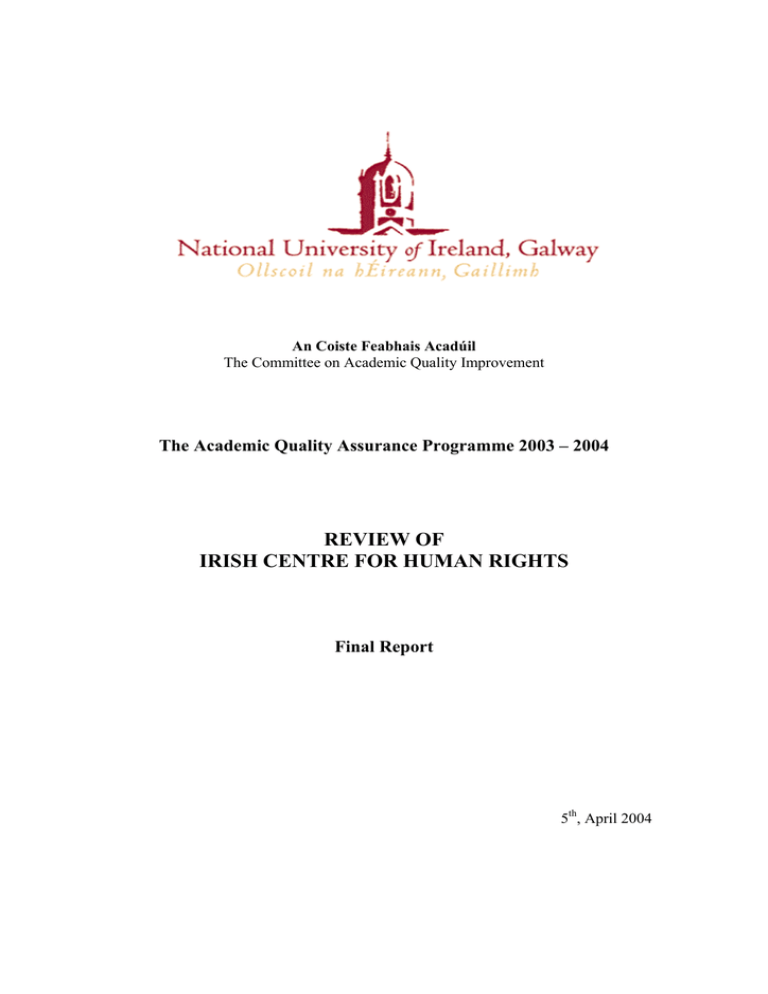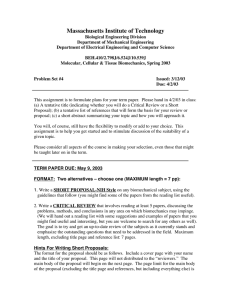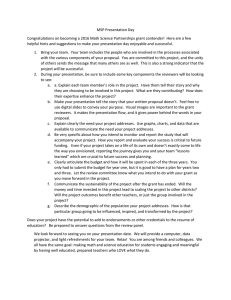REVIEW OF IRISH CENTRE FOR HUMAN RIGHTS
advertisement

An Coiste Feabhais Acadúil The Committee on Academic Quality Improvement The Academic Quality Assurance Programme 2003 – 2004 REVIEW OF IRISH CENTRE FOR HUMAN RIGHTS Final Report 5th, April 2004 Irish Centre for Human Rights: Review Group Report This report arises from a visit by a review team to the Irish Centre for Human Rights on the 10th-11th February, 2004. The Department had already prepared and submitted a 'Self Assessment Report' that, with other documentation, was made available to the review team well in advance of the visit. The review team consisted of: Ms Angela Hegarty, School of Law, University of Ulster, (Chairperson); Professor Colin Harvey, School of Law, University of Leeds; Ms. Jane Liddy, Former President of the first Chamber of European Commission of Human Rights; Dr. Niall Ó Dochartaigh, Department of Political Science and Sociology, National University of Ireland, Galway; and Dr. David O’Sullivan, Department of Industrial Engineering, National University of Ireland, Galway acting as Rapporteur. The report is structured to cover the following main topics: 1. Aims and Objectives 2. Organization and Management 3. Programmes and Instruction 4. Scholarship and Research 5. Community Service 6. Summary and Concluding Remarks 1. Aims and Objectives The reviewers acknowledge the effort and significant amount of work in preparing the documentation received before and during the review visit. The documentation was helpful in informing the reviewers of the work of the centre. Documentation included a comprehensive five year strategic plan. Informally, the aims and objectives of the centre were articulated by all staff interviewed. Staff displayed a very high esprit de corps, collegiality and shared purpose. The annual reports and bulletins produced by the centre are rich in information about the centre’s achievements and plans for the future. The review group acknowledges and supports the emphasis on research as a primary activity of the centre and also acknowledges the contribution to teaching. We recognise that the centre has become a world class human rights centre in a remarkably short period of time. The reviewers would like to offer the following recommendations to underpin the centre’s aims and objectives: 1.1 1.2 The centre should continue to explore its relationship and work to strengthen lines of communication on a routine basis with the law faculty and school of law with a view to participating in ‘law’ development within the University and collaborating across research and learning programmes. The reviewers recommend the establishment of annual or biannual meetings between senior personnel in the Law Faculty, Law School and the Centre to discuss areas of common interest in research and teaching. In preparing for future quality reviews we recommend that more attention be given to ensuring that the documentation adhere to the quality assurance guidelines e.g. provision of external examiner reports and student surveys. IrishCentreforHumanRightsFinal Report04 1 Irish Centre for Human Rights: Review Group Report 2. Organisation and Management The high esprit de corps within the centre allows for a relatively informal and cooperative approach to organisation and management. We also recognise that this can entail managerial limits and difficulties. Staff display an eagerness and flexibility in dealing with organisational and management issues. Staff meet regularly for both formal and informal meetings. The diversity of staff (from all continents of the world) and with diverse yet complementary interests is a major strength in helping the centre achieve its aims and objectives. Staff appear empowered to act on the aims and objectives of the centre with the active support of senior management. The engagement of PhD students in some of the administrative tasks (arranging conferences and workshops etc.) of the centre is very helpful to staff and allows students to gain experience. The reviewers would like to offer the following recommendations to improve the centre’s organisation and management: 2.1 2.2 2.3 2.4 2.5 In order to facilitate the aims and objectives of the centre that a clear and effective management structure be put in place. These procedures should address issues such as absence of staff, in particular senior staff, during the normal academic year and the increased workloads of administrative and academic staff. A clear description of the respective roles of director and deputy director should be produced. More structured management of all staff loads at the centre with visible and written allocation of workloads, The administrative burden in the centre has naturally increased and there is a need to set clear limits to the workload of administrative staff. The centre needs to do more to ensure that the workload on PhD fellows does not expand beyond contractual requirements. This is necessary in order to protect students’ research time. 3. Programmes and Instruction The centre has a major post graduate teaching commitment. The range of teaching programmes based both on campus and abroad (e.g. Malta and Venice) is to be commended. All staff appear to have a fair teaching load. The reviewers believe it is time to consolidate the teaching load of the centre while honouring the commitment to the existing student population. Students were a delight to talk to, regarding the running of the taught programmes and a continuum of views were expressed. The reviewers would like to offer the following recommendations to improve the centre’s programmes and instruction: 3.1 The centre should institute quality assurance mechanisms for its teaching such as the following: staff-student committee with formal minutes and actions; a comprehensive student handbook; induction sessions for new students including PhD students; the circulation of external examiner reports to staff; avail of staff training programmes available on campus; timetables and class rescheduling which is sensitive to the learning needs of all students; ensure the consistency of the application of assignment deadlines; ensure consistent moderation of marking across all programmes; IrishCentreforHumanRightsFinal Report04 2 Irish Centre for Human Rights: Review Group Report 3.2 3.3 3.4 3.5 3.6 The centre should conduct student surveys for all courses and programmes run through the centre. This is a time to consolidate rather than expand teaching activity and ensure than commitments to existing students are underpinned by appropriate resources particularly in the area of library and computer facilities The University should make an investment in significantly upgrading the book collection relating to human rights available to student through the University library Channel some resources into significantly upgrading the centres web site to make it more collaborative and central to the exchange of communications between staff and students. The centre should consider cutting back on the range of optional courses available to LLM students as the range of courses is wider than is necessary. 4. Scholarship and Research The centre is highly research active and produces a research output which is regarded by reviewers as world class. The information provided regarding research output is extremely impressive. The centre is a major contributor to the University’s stated research aims and objectives. Reviewers noted the high dependence on external research funds to support its research activities. The use of research reports and annual PhD presentations were regarded as useful by researchers towards their research objectives and this was noted by the reviewers. The reviewers would like to recommend the following: 4.1 4.2 4.3 There should be clear guidelines regarding supervision routines and expectations for Ph.D students. PhD completion rate needs to be monitored The University should develop measures to gauge research output. 5. Community Service The centre is very active in its community service and outreach activities. Reviewers were very impressed with the range of national and international outreach activities. The proactive engagement with NGO communities through seminars, workshops and various other events is commendable. The centre’s activities are thoroughly international and in this regard its engagement with communities as far afield as China and Sierra Leone are impressive. The reviewers would like to offer the following recommendations to improve the centre’s service to the broader community: 5.1 Feeding back knowledge to Irish community: in this respect the reviewers cannot ignore the fact that the European Convention on Human Rights with its body of 50 years case law has been incorporated into Irish law with effect from this year and that Irish society would benefit greatly from expertise of the calibre to be found within the centre. IrishCentreforHumanRightsFinal Report04 3 Irish Centre for Human Rights: Review Group Report 6. Summary and Concluding Remarks This is a centre of very high international standing and regard, which it has achieved in a remarkably short period of time. In many ways the centre is a global model of its kind and the reviewers were tremendously impressed with the energy, commitment, work rate and entrepreneurial approach adopted throughout the centre. Its contribution to the University, to the country and to the global understanding and promotion of human rights is significant and unique. The centre has very clear aims and objectives and a very highly motivated staff and student body. The range of activities is impressive and its primary focus is and should remain research. There is also a natural focus on teaching, which complements good research. The teaching focus brings with it a continuous and uninterrupted need for the delivery of quality teaching and pastoral care of students. In conclusion the review group expresses its gratitude to all of those at the centre and the university who facilitated its visit and who allowed the reviewers to learn more about the very important work being undertaken at the centre. We make our recommendations in the hope that they will, if implemented, make that work even better. Ms Angela Hegarty (Chair) Professor Colin Harvey Dr. Niall Ó Dochartaigh Ms. Jane Liddy Dr. David O’Sullivan (Rapporteur) (Thursday, 19 February 2004). IrishCentreforHumanRightsFinal Report04 4

